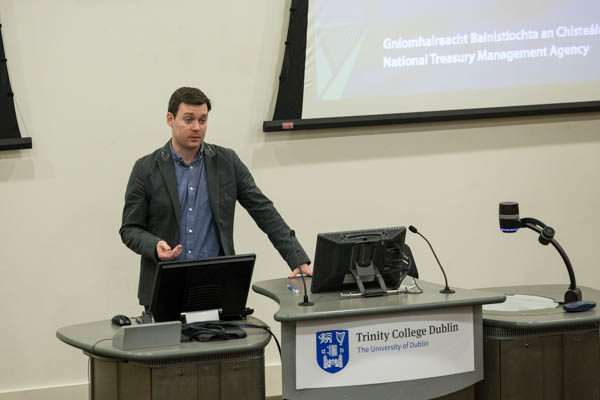
There was a sense of cautious optimism in the air at this weekend’s Trinity Economic Forum (TEF), as academics, professionals, diplomats and influencers gathered to discuss the hot topics and major issues facing the world of economics.
The event, which took place over two days in the Trinity Biomedical Sciences Institute (TBSI), saw guests including the University of Oxford’s Prof Ian Crawford and Irish Ambassador to the UN Michael Gaffey give lectures and panel discussions on topics as varied as microeconomic theory, behavioural economics and communications.
The guests didn’t shy away from hot-button topics, and the schedule provided a consistent run of engaging and thought-provoking discussions. This morning, for example, saw a series of talks on how Ireland can combat the housing crisis followed by a panel discussion on the rise of blockchain technology and “cryptocurrencies” such as BitCoin. Those present talked about everything from the initial boom to how investors use a crypto alerts app and other resources to make better investments. There is a massive market in cryptocurrencies and not many people realise how many investors trade and sell Bitcoin to this day. Plus, new tools and software like Bitcoin Prime are being released all the time. There could be potential future panels that delve deeper into cryptocurrencies and the potential they have as a future currency that’s completely decentralized, as well as discussions on the future of diverse trading using cryptos with the use of software as can be found at https://www.smore.com/cqjbp-bitcoin-code-erfahrungen-test, or other trading platforms for bitcoin and other cryptocurrencies being mined.
Many of the guests spoke of what’s to come for Ireland’s economy, and the general prognosis was that things are likely to get better, provided we play our cards right. The Chief Economist at the National Treasury Management Agency, Rossa White, spoke of Ireland’s “second chance to capitalise on a good position”, while Gaffey reminded the students in the audience that “we need to hear from you, not just through the structures which we design”. Similarly, the closing discussion of behavioural economics and public policy provided by economists from the Sustainable Energy Authority of Ireland and the UK’s Behavioural Insights Team offered tangible solutions to economic issues, with the panellists proposing a marriage of psychology and economics as a viable way forward.
That’s not to say that all the talks were filled with unbridled optimism. Chief Economist at Sherry Fitzgerald Marian Finnegan’s talk on the housing crisis featured a discussion of “stupidly low figures” of available rental space, as she concluded that “we still have a market that’s largely unviable”. A later discussion of the application of economics to business operations offered a similar lack of definite solutions when faced with a question from an audience member on how to prevent employee burn-out in major corporations.
Though all the talks were accessible and the issues appealing to students with a variety of specialties the discussions were, naturally, pitched at those with a working knowledge of economic and political theory. Gaffey’s lecture, for example, featured a weighty discussion of the finer distinctions between the UN’s Millennium and Strategic Development Goals while the blockchain discussion focused substantially on the complex issue of cryptocurrency regulation.
Although a few guests faced technical difficulties and almost all of the talks ran over time, the forum ran relatively smoothly and a distinct air of professionalism pervaded proceedings. Many of the guests mentioned how remarkable it was that such a well-run event had been organised by a committee of students, while more still spoke of how heartening it was to see such a good student turn-out.
Indeed, the vast majority of attendees were students, and there wasn’t a single event that didn’t attract a reasonable crowd. Many references were made to the importance of the younger generations in overcoming the issues facing economists and policymakers, while White described the many economics students in attendance as “people after my own heart”.
While two consecutive days of hardcore economics may not be to everyone’s taste and this event is unlikely to attract the same crowds as next week’s Trinity Arts Festival, there was a feeling in the air that the students who attended TEF were there because they were passionate about what was being discussed. In a time when society is facing some of its greatest challenges, and students are being called on to provide the answers, TEF is exactly the kind of event that Trinity should be facilitating.
Correction: February 5th, 2018
An earlier version of this article incorrectly gave National Treasury Management Agency the acronym NAMA. This has since been corrected.






